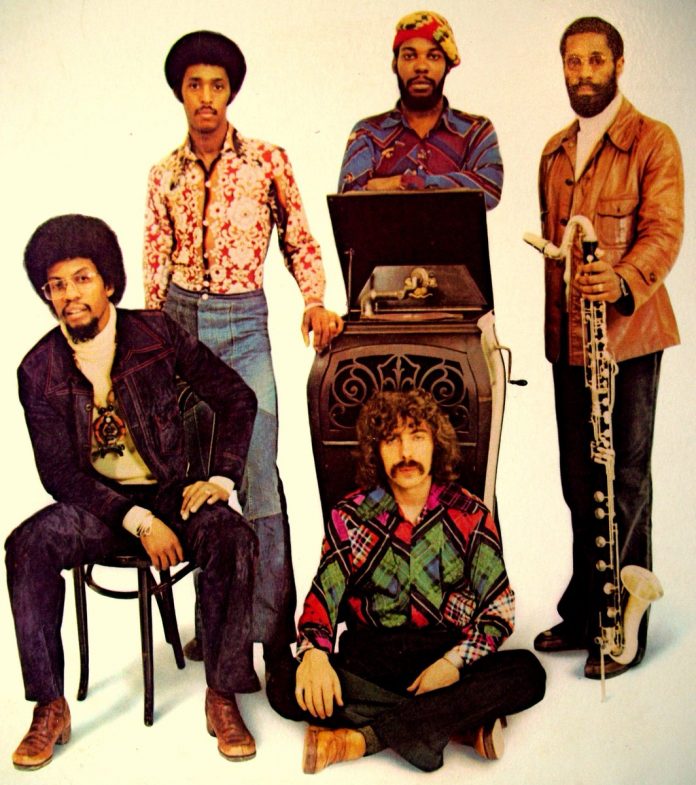By 1967, and with a great deal of playing experience to his credit, Clark turned 21 and moved to Oakland. Adding to his already impressive resumé, he was now drumming with groovy organ trios and behind blues acts such as Albert King, Albert Collins and Jimmy Reed. It was around this time he was also developing a fetish for soul and funk music and began experimenting with the linear-style funk grooves he is notably known for today.
‘I got tired of hearing myself play those regular boogaloo beats and started adding what they later called linear beats to the tunes. Night by night I would add or subtract beats and use different parts of the drum set at different times … By the time I met Herbie Hancock I could play this stuff backwards and inside out using my method’
“I was on an organ gig for about three or more years and we were playing Mercy, Mercy, Mercy and some of the funkier Horace Silver, Lee Morgan or Jimmy Smith stuff”, he explains. “I got tired of hearing myself play those regular boogaloo beats and started adding what they later called linear beats to the tunes. Night by night I would add or subtract beats and use different parts of the drum set at different times. Instead of the coordinated independent thing, I would string one hand on the hi hat, one or two bass drum notes here, a backbeat there, a tom tom over here. Soon it started taking shape and people would really dig that style so I left it in. By the time I met Herbie Hancock I could play this stuff backwards and inside out using my method.”
But before Clark met Hancock he ran into Paul Jackson, the bassist who would become his best friend, housemate, soul brother and lifelong partner in time. It was also Jackson that would recommend him for the drum chair in Hancock’s Head Hunters band. “Let me just say, nobody on the planet knows me as well as Paul. I have never had that much fun on and off the bandstand with anybody ever in this lifetime. He and I play like one person, total trust and radar. You don’t even have to count the music off, we can just start … It’s like telepathy!”
Clark remembers that he met Jackson not long after he arrived in Oakland and that they at first played in straightahead jazz trios before an experimental fumble on a new instrument sparked an unplanned jam and what would be the start of a exciting new direction for the pair stylistically.
“Yeah, Paul worked at Sherman Clay Music (store in San Francisco) when he brought an electric bass to my house. It sat in the music room for a long time and then one day he broke it out and started playing exactly as he would later would with Herbie upon taking it out of the case! I started playing along and we immediately fell into the funk thing we later got known for. It happened spontaneously and took hold within seconds. Soon we started playing this style with many groups in the Bay Area and became known for this.”
While the pair continued to jam, rehearse and gig together, it was a phone call from Hancock and the invitation to join Jackson in the Head Hunters band that would further fuel their creativity as a rhythm section. “Well, Paul was my roommate at that time and Herbie would often call the house to talk to Paul who was never home so I would talk to him for hours about everything – boxing, politics, cars, jazz … whatever. Herbie was so much fun to hang on the phone with, totally accessible. One day he called needing a drummer and said ‘Paul told me you have your own unique way of playing funk’ to which I replied ‘I’m not sure, you would have to decide that.'”
With a rehearsal space fixed, Hancock invited Clark to come and jam. Playing jazz almost exclusively then, the drummer remembers setting up his small Gretsch jazz set and playing in a way influenced by Elvin Jones or Tony Williams, which he states was the hip thing to do at that time. “Herbie said ‘I can dig it but we aren’t doing that kind of thing. Can you put a pillow against the bass drum and play your funky thing Paul told me about?’ I did and he hired me straight away.
“I was worried though that if I took this gig playing this funky style, it might mess up my jazz thing which was going really well at that time.
“I was playing with everybody – Woody Shaw, Bobby Hutcherson – and getting all kinds of great jazz work. Because Herbie was a great guy and you could talk to him about things, I mentioned this to him and he said ‘Yes, you’re right, it may put a crimp in your jazz workload’, which it ended up doing for many years, but added that if I joined his group everyone in the whole world would hear me. I was 25 years old and I was like ‘Hell, yeah!'”
The Post-Bop Drum Book by Mike Clark is now available to order here: https://hudsonmusic.com/product/the-post-bop-drum-book/


